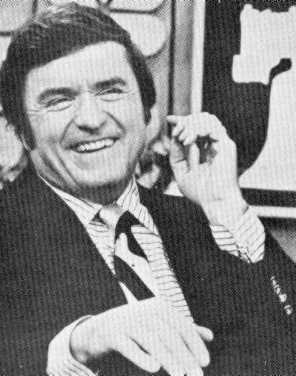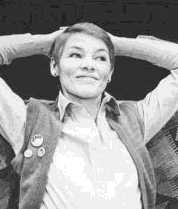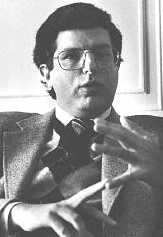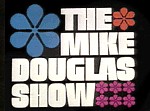 |
Title: The Mike Douglas Show (TV show) |
The Mike Douglas Show
Host: Mike Douglas. Guests: British Oscar winning actress Glenda Jackson, composer/conductor Marvin Hamlisch and Tom Waits.
|
|
|
|
|
Mike Douglas |
Glenda Jackson |
Marvin Hamlisch |
MD: [close-up] You're about to see an extraordinary performer. It's hard to put a label on him, that's always something he avoided, because he's kind of a combination: poet, jazz singer and vagrant with a surprising amount of personal charm. Here is Tom Waits!
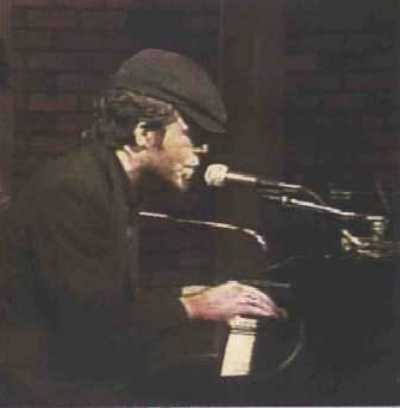
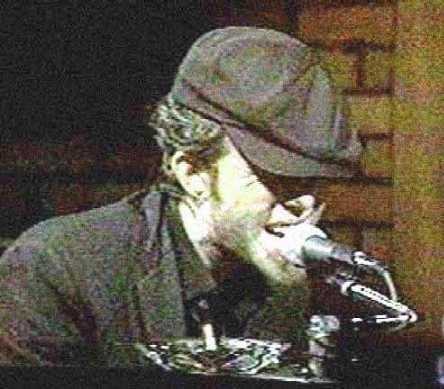
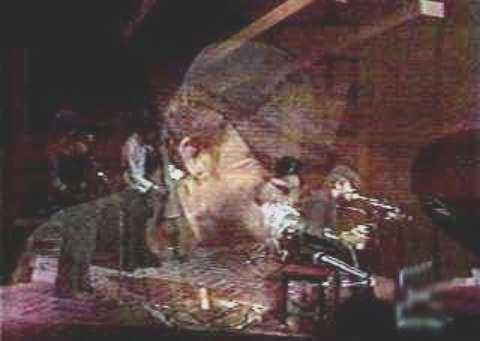
Waits at the piano, wearing his ratty black sports coat, the black and white tie, black beret, ashtray on the piano. Performs: Eggs and Sausage]
MD: [walks over to the piano] We're coming right back!
[Break]
[They're sitting down. Glenda Jackson: smoking a cigarette, smiling. Hamlisch: a suit with glasses. Waits: smoking, tipping of his cigarette every three seconds, leaning back and forth, staring at his shoes. Hiding his eyes behind his beret.]
MD: Eh Tom, I want you to. You're eh. You project a very strange image of eh. How would you. How would you describe what you're doing?
TW: Oh eh. I don't know, I'm perhaps a little bit of a curator. I'm a little bit of a curator and eh I do nocturnal *?* And eh I kinda of eh travelogues, and that sort of thing. Eh, I'm an unemployed service station attendant most of the time. I'm just lucky, I'm a living and breathing example of success without college, is what it boils down to *?*
MD: Was your voice always like this?
TW: No eh, it eh. actually I can just sing like eh.Alberghetti, I eh. [laughter]
MD: Then you started smoking. Ha, ha!
TW: I just talk this way on the weekends
MD: All of us, when we're growing up, and thinking of. you know we love music. And I particularly did.I, all of us have people we listen to who were great influences on us. Who were you listening to when you were thinking about this?
TW: Oh, eh I like: Mississippi John Hurt. I like Hubert Selby Junior. And I like Chuck E. Weiss. And I like eh Lord Buckley, Neal Cassady and eh *?*, Shearing, Symphony Sid. And I listen to eh, Cole Porter, George and Ira Gershwin, Irving Berlin, Jerome Kern, Johnny Mercer eh.
MD: Wait, wait, wait. You just hit upon a guy I think is. had a special quality. Even when he got "fat" as they say eh and successful. He still had that wonderful earthy quality about him. I was at a party with him and I was sittin' with him, just like you are sittin'. Just singin'. That was marvelous. Johnny Mercer, boy he was a giant. He...
TW: Yeah, I agree. I have a lot of the 78's of his as a matter of fact.
MD: You came from a middle class background. Even though you sing about the eh. seamy side of life. How did you learn about the seamy side of life? Did you hang out with some guys that were on their uppers, or what?
TW: Oh eh, I don't consider myself seamy really. You know?
MD: No, I didn't say you were seamy. I said, you convey that. You know, in what you do. Kind of.
TW: That's my own frame of reference I guess, you know. I played some real toilets, eh. [laughter].
MD: I did my share of that too! Believe it or not! I played some great ones boy! Gussy's Kentucky Lounge in Chicago...
TW: [mock bravery] Oh, I was there last night.
MD: Really? I thought I'd recognize that jacket [points to Waits]. You classify yourself as a poet or as a singer. Which one do you like to be classified at?
TW: Oh eh. I'm a Methodist Deep down inside eh. It's hard to say [Douglas can no longer hold his laughter].
MD: [to Marvin Hamlish] Can you comment Marvin, on Tom's music?
MH: I don't know, but I'll tell you one thing. He'll have to do something or he'll kill himself with these cigarettes [waves away the smoke in the air, huge laughter]
MD: How many packs a day do you smoke? Seriously.
MH: I have yet to see him without a cigarette in his head!
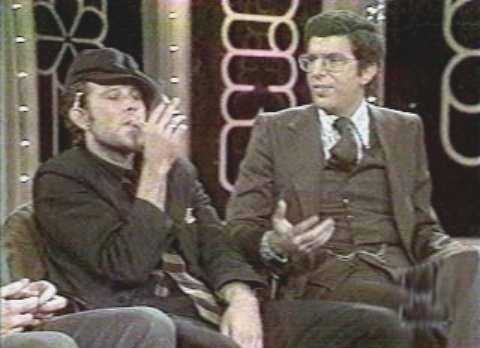
"... or he'll kill himself with these cigarettes! "
TW: [to Hamlisch] You wanna walk around in my shoes for a while? [shows his broken shoes to Hamlisch]
MH: They look comfortable, I tell you that!
MD: I'll tell you one thing, they're broken in!
TW: No, I don't know. I played the real toilets. Going back to your previous question about the seamier side of life. I play at, well all different kinds of joints. I play eh auditoriums and eh.
MD: What's your preference? Do you like an intimate kind of room?
TW: I like it when it's that way. You know, full of kind of a convoluted sort of compendium maybe. I don't know, it depends on where you're playing, you know? If you're playing on Premrose Lane or you are in Tuxedo Junction, or in Cincinnati, or anywhere. It's different every night, it seems to me. So I eh. I don't know. An audience full of four-speed-automatic transvestites, and eh unemployed shortstops. That sorta thing. You know?
MD: Unemployed shortstops are the hardest to please.
TW: I found that to be true myself.
MD: They like hot grounders and eh they don't know anything. Not in your four/four.
MD: I'm told your gonna do the title song from your new album for us right now.
TW: That song is a story.
MD: Did you write it?
TW: Yeah I covered a homicide on 42nd Street and that's what it really is. It's a story called: "Small Change got rained on with his own 38" And eh, and it's eh kind of a, kind of a eh Jack Webb, sort of a Spilane kind of a eh, of a eh (all-good-night?) sort of a story.
MD: Do you need a light Tom?
TW: No, no, it's alright. They got a lot of eh.. [points at the studio spotlights. Glenda Jackson passes her cigarette to Tom]
MD: You wanna get a light from Glenda. That'll be something to tell your kids about! You have any kids?
TW: . eh ..... No? [laughter]
MD: No. That took you a long time to decide! You're gonna do that song or are we gonna just play the record and sit around?
TW: No eh. [walks to stage]
MD: Tom Waits!
[Waits performs Small Change accompanied by sax only]
MD: That's Tom Waits! Thank you Tom! We'll be right back.
END.
At the end of the show (during the credits) Douglas and his guests do this silly dance to the shows tune. Waits stands aside and refuses to join. Douglas grabs him and tries to get him do a few of these silly steps. Waits, trying to be cool, reluctantly lifts his right foot, lifts his left foot after which Douglas bursts out in laughter.
Notes:
In 1976 Don Roy King was directing the CBS Mike Douglas Show. This is his hilarious story, giving some insight into whether or not Waits was only an act. You decide. (Sent as an e-mail to "Blue Valentine" (the Italian Tom Waits fanclub) July 2, 1999. Forwarded by Francesco to the Raindogs Discussionlist July 5, 1999. Jay S. Jacobs included it in his 2000 biography "Wild Years, the Music and Myth of Tom Waits")
Don Roy King's story:
"It was a great hook, I thought. He started his set in character, sort of a half-buzzed derelict with the voice of a bulldozer, slurring his way through a metaphor-rich stream of semi-consciousness. It was 1973. Reno Sweeney's, a small club in Manhattan. "Tom Waits" the program said, the opening act for a lovely, thin-voiced flight attendant turned cabaret singer (turned flight attendant, I'll bet). I couldn't wait for him to drop the act, to see what he was really like, to hear how he really sounded. Well, song after song went by. Each rich and gutsy. Each with its own syncopated stutter-step of urban images and dark-side tales. Some were brash. Some were tender. All were captivating. The moods swung and flipped and flayed. But Tom never changed. He played the role straight through. He never looked at us. Never smoothed out the gravel. Never put out his cigarette. (He did balance it on his stool once when he sat down to play the piano.) The whole set as that derelict. A gutsy, shrewd act, I thought.
Fast forward. 1976. I was directing the Mike Douglas Show in Philadelphia. The name Tom Waits came up in a booking meeting. He had a new album, I think. A press release had been sent to our head booker. I was the only one on the staff who knew the name. "He's great," I said, "the night I saw him he played this character on stage, sort of a beatnik street poet. Let's give him a shot." We did.
One week later during rehearsals, I got a panic call. "Tom Waits isn't here yet. The car picked him up but nobody's seen him!" Well, someone had seen him, actually; and that was the problem. The security guard at the door wouldn't let him in. "There is no chance," he thought, "that this guy is on the show! Our guests own combs, razors and shoes, well, at least shoes with laces!!"
My stage manager rushed out to get him. Tom was asleep in the lobby. Now it was my turn to panic. Tom Waits shuffled into the studio, mumbling something about South Philly, scratching a three-day beard, balancing an inch-and-a-half ash on a non-filtered cigarette. "Oh my God," I thought, "It wasn't an act!!! I pushed for this guy to be on our national television show, and he's going to panhandle the audience!!" We didn't have time to rehearse. I sent Tom up to the band leader, Joe Massimino, to go over his charts; we opened up the house, and set for the show. Ten minutes later, Mike Douglas stormed into the control room. "Who is that?!! I just stopped in the green room to say hi to the guests and there's some homeless guy in there asleep! Don't we have any security here!!" "It's okay, Mike," I blustered (in a tone that is now known as "Clinton Under Oath"). "He is a guest. That's Tom Waits. Jazz singer. It's just a role he plays. You'll love him." Mentally, I was typing my resume. The first half of the show went by in a blur. I can't remember who the co-host was that week - Shecky Green, Red Skelton, perhaps. Maybe Joey Heatherton, Robert Goulet, Roy Clark -- some name of 70's popular culture. I can't remember any other guests either. Could have been Professor Irwin Corey, Shari Lewis, the Amazing Kreskin, I don't know. But what I do remember is Tom Waits. And I'll bet every member of that staff and crew, every member of the studio and home audience remembers him, too. Tom knocked 'em dead!
Mike introduced him. "A new talent on the cabaret scene, blah-blah-blah." Something like that. And then suddenly, there was Tom and all the regular rhythms of television talk skidded from four/four time into some beat only three-armed drummers could play. Mike was asking simple "how did you get started" kinds of pre-written questions, but Tom was answering in this other-worldly, or rather under-worldly way. He was sputtering and wheezing and barely intelligible but genuinely poetic. Street poetic. His answers sounded like quotes from some Clifford Odets Depression play. Mike was getting nervous. I was holding my breath. "Well, why don't you sing for us, Tom," Mike said, after a quick glance to his floor producer who suddenly didn't know which cue card to hold next. I'd never heard the control room so quiet.
Tom got up, lurched to the performance area, and began. Small Change got rained on with his own .38 and nobody flinched down by the arcade. Right there on the chirpy, sparkling, squeaky-clean Mike Douglas Show, some urban low-life named Small Change died in the street, shot by his own handgun, left to lie in the gutter. Small Change got rained on with his own .38 and no one's gone over to close his eyes and there's a racing form in his pocket, circled Blue Boots in the 3rd. There were "naked mannikins with Cheshire grins," "raconteurs and roustabouts" saying "Buddy, come on in." Cops telling jokes about "some whore house in Seattle." It was a first for national daytime TV. Small Change got rained on with his own .38. and a fist full of dollars can't change that and someone copped his watch fob and someone got his ring and the newsboy got his pork pie Stetson hat. I glanced over at Mike's monitor. He was hooked. I saw that small, crooked smile of his, the one that meant he liked what he saw. I always believed that Mike's success was due mostly to his unselfish love of performers doing well. He didn't mind being upstaged by his guests. If they got big laughs or standing ovations he was thrilled. They'd scored on his show, and he loved it. Well, he was loving this. Tom was mesmerizing and he knew it. We all knew it. and the tuberculosis old men at the Nelson wheeze and cough and someone will head South until this whole thing cools off cause Small Change got rained on with his own .38. In three riveting minutes the painting was done. It was harsh and hard-edged and very real. But there was an abstract rush to it, too. Some steady hand had splattered reds and blacks and yellows in a way that opened up a dark and unknown world and let us in. We'd been escorted to those back streets we fear, those alleys we've never seen after dark. And there we met and almost got to know some poor loser named Small Change. I almost sent flowers. Mike jumped up at the end, rushed over to Tom. I could tell he was surprised and happy and relieved (not nearly as relieved as his director, however). I seem to remember Mike putting his arm around him, probably catching his ring on the rip in Tom's jacket. Tom mumbled a thank-you, and the show went on. The next day we had another ninety minutes to fill. I'm sure we did it with Dolly Parton or Dom DeLuise or Rosemary Clooney. But things were never quite the same. Every camera operator, every band member, every writer on that show did Tom Waits impressions for weeks. I heard Mike himself break into a "Small Change" refrain at least twice. And to this day, I'll bet fifty people tell this story as one of their highlights from the good old days.
And now, twenty-three years later, Mike's retired; John Denver and Jerry Vale are gone; we hardly ever hear from Henry Winkler or John Byner; Phyllis Diller pops up every one in a while for a nostalgic flash-back; but Tom Waits, that wizened and wise observer of the darkness, still haunts the shady side of the street, the rusty fire escapes of our dreams, and the alleys where our deepest demons live. And he still puts on a hell of a show, too."
Further reading: Mike Douglas (Mike Makes Your Day), Mike Douglas biography (Authorlink), Glenda Jackson (Campaign For Mayor 2000), Glenda Jackson (Classic Movies), Marvin Hamlisch (Washington Post), Marvin Hamlisch (Ann On-Line).


